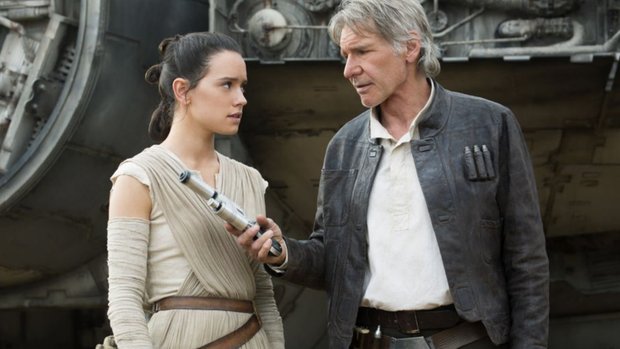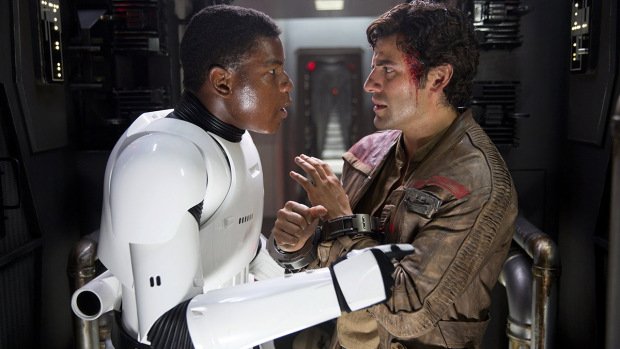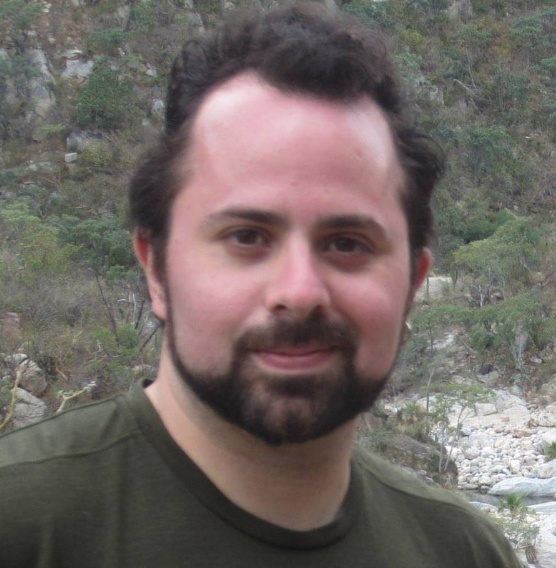Does Star Wars: The Force Awakens hold up four months later?
Spoilers. Of course spoilers. Come on now.
This week, I had a mission: to watch Star Wars: The Force Awakens at home. Now that the movie is out on DVD and Blu-ray I wanted to watch it four months on, free of the hype and anticipation and all the baggage of caring way too much about a piece of pop culture. The goal is to figure out if my first impression was legitimate. Was this a good movie? Not just a good Star Wars movie, but a good story sitting all on its own. The answer I found delighted me: The Force Awakens is excellent. Not only is it not another Phantom Menace, it’s not the remake of A New Hope it claims to be.
The beats are there of course. The Force Awakens echoes A New Hope in both hilariously superficial and more subtle ways. Starkiller Base, even on repeat viewings, remains a limp threat and Han Solo’s dismissive declaration that it’s just a bigger Death Star for the good guys to blow up, while funny, doesn’t lessen this fact. When I first saw Force Awakens back in December, I was irked by how deeply uninteresting the First Order’s big gun was, how incidentally it not only destroyed the New Republic’s seat of power but also how easily it was destroyed itself.

In returning, though, it struck me how little impact Starkiller Base ultimately makes on the plot, the characters or the broader world of Star Wars. The threat of the First Order is spiritual, yes, but deeply terrestrial too. They’re a brute fascistic force that feels local and terrifying rather than omnipresent like the Empire was. They’re scary because, while there’s law and order somewhere in the universe, that can’t stop these bastards from dropping into a podunk town and shooting everyone just to find a robot with dirt on a bearded wizard. In New Hope, the Empire was simply everywhere, unstoppable in its size and reach even before the Death Star destroyed Alderran.
That Starkiller Base feels so familiar, so accepted and almost boring in the tapestry of Episode 7, is just one aspect of a larger truth about the whole story. The Force Awakens is a sad, sad movie. There are thrilling moments, there is high adventure, and joy for its characters, but this is not the galaxy of hard partying teddy bears and friendly ghosts we left in Return of the Jedi. The landscape of The Force Awakens is one where planets can be instantly snuffed out and everyone’s so desensitized to the horror that it just feels normal. This is a place where the hero of all living things, the guy who was supposed to repair years of tyranny, disappeared the moment things got really hard. Love, family, peace: all of it’s broken for the people who fought so hard to have it in the first place. Han and Leia, Chewbacca, poor Kylo Ren, and Luke Skywalker; everyone’s lost even while the universe itself carries on. In A New Hope, it was the galaxy that needed to be saved. Now it’s our heroes that need mending.

This is what made The Force Awakens feel so wonderful as I watched it again. JJ Abrams’ movie isn’t good because it’s grim and gritty, the dark Star Wars a brooding teenager thinks they want so badly. Sadness, as Yoda famously said of war, doesn’t make it great. The recognition that life is complex, that everything doesn’t just get better and stay that way forever when the good guys get a win, is its real success. The number of blockbusters, let alone adventure movies, that explore the complexities of characters in late middle age both confronting past failures and continuing to grow are limited at best. Luke, Leia, Chewbacca, and Han didn’t just sit around awkwardly clapping their hands with Lando on Endor’s Moon. They kept living, things got hard again, and here is a movie about them dealing with it as the universe they lived in kept on changing.
While that makes it distinct from A New Hope, Force Awakens’ other pleasure is that it’s still a movie peppered with new hopes. Finn and Rey are equally steeped in the deep sadness of the Star Wars universe at the beginning, and while they escape the confines of a small personal worlds just like Luke Skywalker did, their perspectives are wholly different. Luke may have been a frustrated doof with serious piloting skills, but he still had a family that loved him. He was safe, or at least as safe as anyone ever is in Star Wars. Rey meanwhile is an orphan that’s been fending for herself practically from birth, while Finn doesn’t even know what it means to be a part of normal human society. While Rey discovers what it’s like to leave behind trauma, Finn’s discovering what it’s like just have a name. As points of entry, characters with perspectives for the audience to attach and relate to, they’re wholly distinct in the Star Wars universe which is deeply welcome. That they’re both warm, flawed, and instantly charming makes them good.
Weekly digests, tales from the communities you love, and more

On finishing the movie, I realized how badly I wanted to know more. Not just about the fate of Rey, Luke, Finn, Leia and Chewbacca, but everything else, the small details that hang from The Force Awakens’ strong foundation like so many stars in a clear night sky. Where is that planet Luke’s been sulking on? Who the hell were those pirate dudes Finn almost took off with? Is Maz Kanata seriously into Chewbacca, because she’s like 700 years older than him, but that’s cool. Is Chewie into older women? Who was that fuzzy guy at the Resistance base, because his hair was straight up lustrous! (His name is Vober Dand, by the way. He rules.) Star Wars: The Force Awakens is not another Phantom Menace or a New Hope. It’s a movie that’s simultaneously made Star Wars more human and mysterious than it’s arguably ever been.



